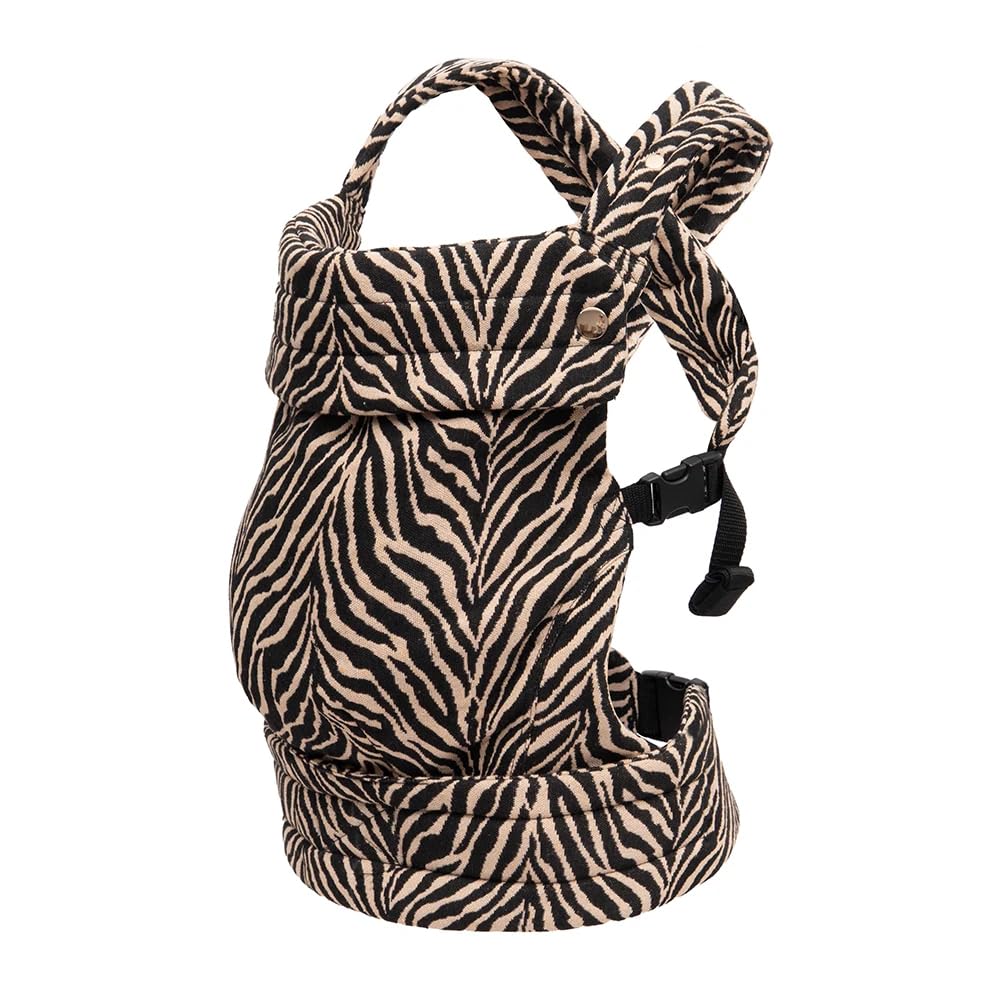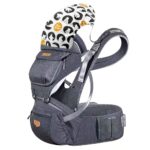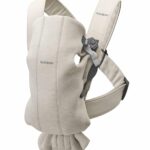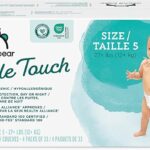Finding the right baby carrier can be a game-changer for parents. Whether you’re at home or out and about, a good baby carrier offers comfort, convenience, and bonding time with your little one. In this guide, we’ll help you explore the best baby carriers for comfort and why they stand out.
Why Comfort Matters in Baby Carriers
As a parent, you’ll likely use a baby carrier for hours at a time. A comfortable carrier ensures that:
- Your baby feels secure. Proper support for their back, neck, and hips is crucial.
- You avoid back pain. Ergonomic designs distribute weight evenly.
- Daily activities are easier. A snug fit allows you to keep your hands free while keeping your baby close.
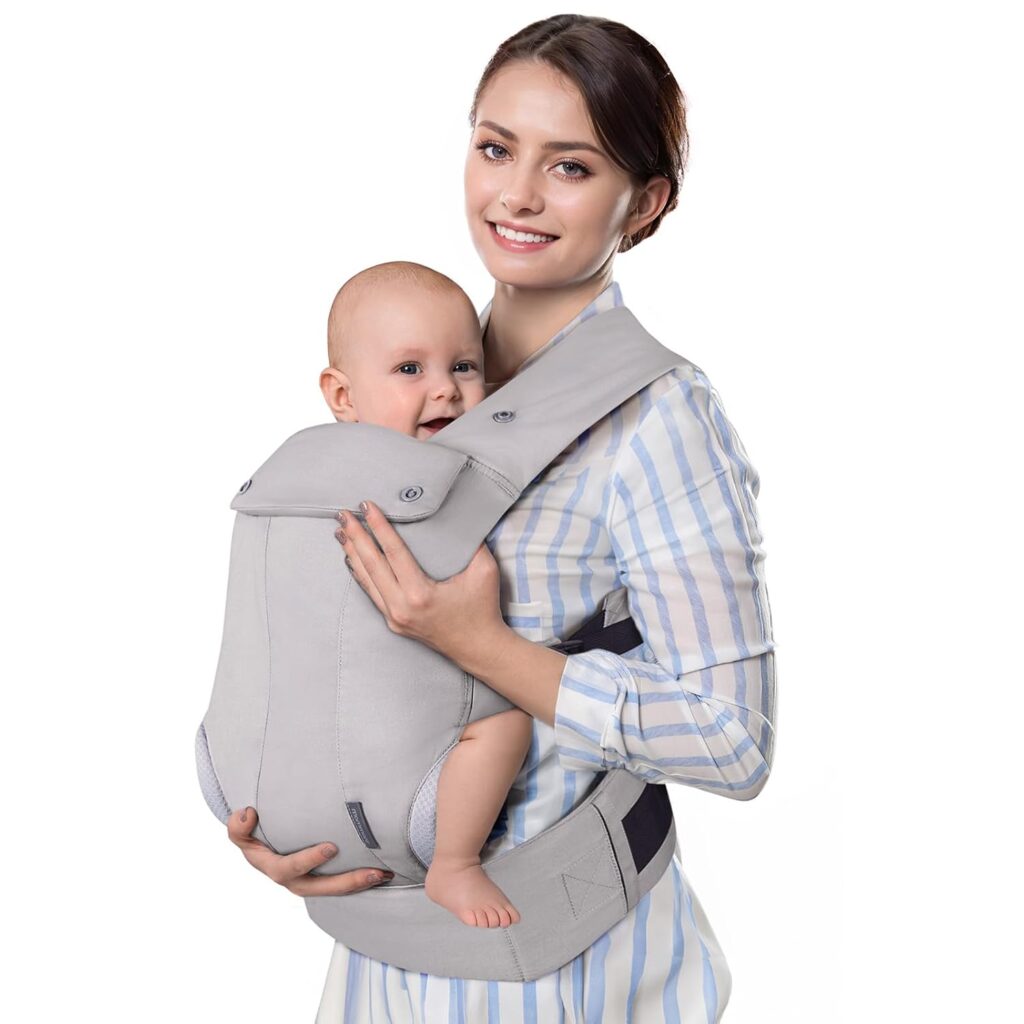
Credit : Amazon
Choosing the wrong carrier can lead to discomfort, aches, and even reduced use. Let’s ensure that doesn’t happen.
Best Baby Carriers for Comfort That Didn’t Work for Me
Over the years, I’ve tried multiple carriers. Some didn’t live up to the promise of comfort. Here’s why they missed the mark:
1. Brand A Carrier
This carrier looked promising at first. It had stylish designs and adjustable straps. However:
- The padding was too thin, making it uncomfortable after 20 minutes.
- My baby seemed fussy, likely because it didn’t offer proper support.
2. Brand B Wrap Carrier
I thought this wrap would be perfect for newborns. But:
- The fabric was tricky to tie securely.
- It lacked back support for me, leading to strain.
While these carriers didn’t work for me, they might suit others with different needs or body types.
The Features of a Comfortable Baby Carrier
When looking for the best baby carriers, here are some key features to consider:
1. Ergonomic Design
A good carrier supports your baby’s hips in an “M” position. This keeps their legs spread naturally, avoiding strain.
2. Breathable Material
Look for carriers made of lightweight, breathable fabric. It helps prevent overheating for both you and your baby.
3. Adjustable Straps
Ensure the carrier fits you well. Adjustable straps allow parents of different sizes to use the same carrier.
4. Padded Straps and Waistbands
Extra padding makes a big difference. It reduces pressure on your shoulders and back, even during long use.
Top Picks: Best Baby Carriers for Comfort
After testing and researching many options, these are the baby carriers that stand out for comfort, usability, and quality.
Carrier A: Ergonomic Excellence
Why It’s Great:
- Designed with padded shoulder straps and a wide waistband for extra comfort.
- Provides full back support for parents, even during extended wear.
- Supports the baby’s hips, ensuring an ergonomic “M” position.
Pros:
- Lightweight and breathable fabric.
- Easy-to-adjust straps for parents of all sizes.
- Machine washable.
Cons:
- Limited storage pockets.
This carrier is ideal for parents who prioritize proper weight distribution and simplicity.
Carrier B: The Wrap That Works
Why It’s Great:
- Made from soft, stretchy fabric that is gentle on a newborn’s sensitive skin.
- Can be tied securely to fit snugly around the parent’s body.
- Excellent for bonding during the early months.
Pros:
- Perfect for newborns up to six months.
- Compact and easy to pack for travel.
- Available in multiple colors and patterns.
Cons:
- Steeper learning curve for tying.
- Less supportive for heavier babies.
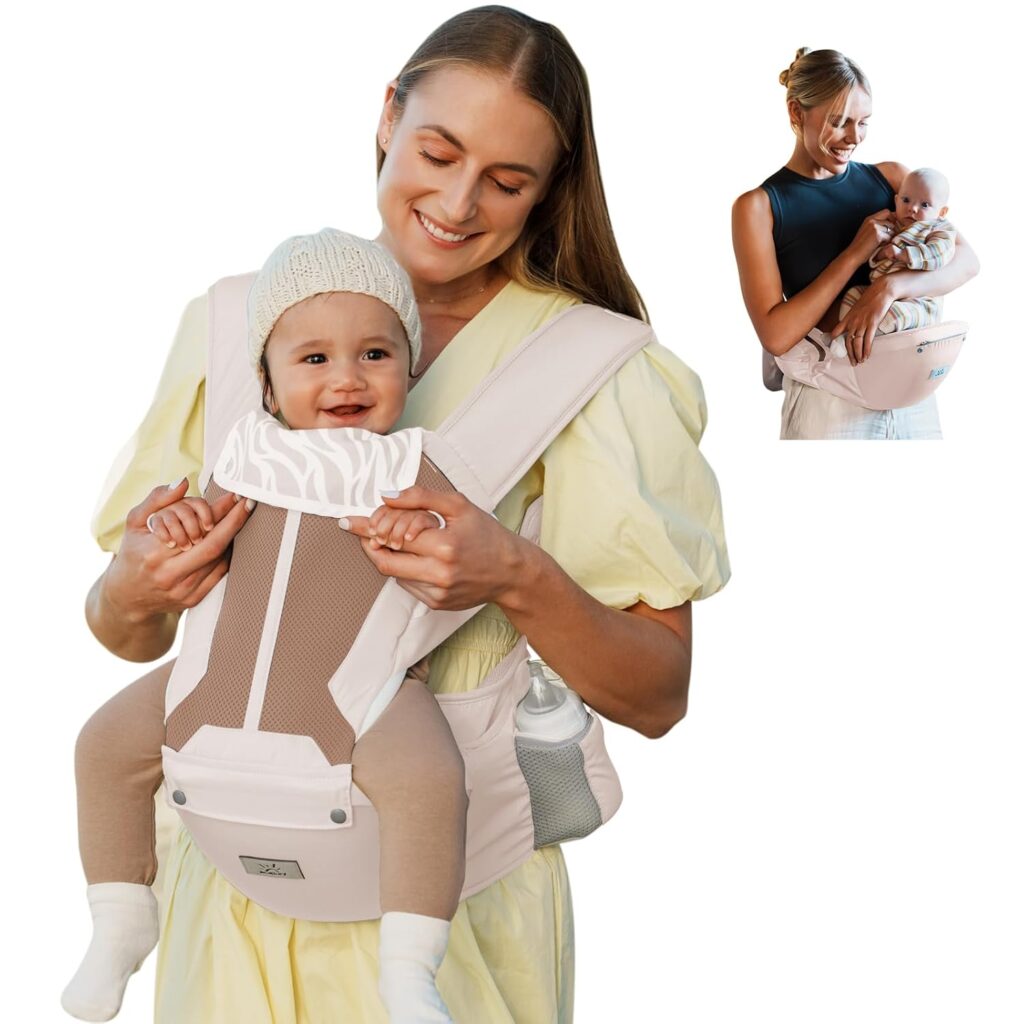
Credit : Amazon
This wrap is perfect for newborns and offers a cozy, intimate experience.
Carrier C: Versatile and Comfortable
Why It’s Great:
- Can be worn in multiple ways: front, back, or hip carry.
- Includes lumbar support to reduce strain on your lower back.
- Equipped with a detachable sunshade for outdoor adventures.
Pros:
- Versatile carrying positions.
- Suitable for babies from infancy to toddlerhood.
- Comes with a small pocket for essentials.
Cons:
- Slightly heavier compared to other carriers.
For parents seeking versatility and longevity, this carrier ticks all the boxes.
Tips for Choosing the Right Baby Carrier
Follow these tips to find the best baby carrier for comfort
1. Understand Your Needs
Think about how you plan to use the carrier. Do you need something lightweight for quick errands or a robust option for long outings?
2. Consider Your Baby’s Age and Size
Some carriers are perfect for newborns, while others grow with your baby into toddlerhood. Choose one that matches your baby’s current stage.
3. Test Before You Buy
If possible, try different carriers in-store to see how they feel. Check the fit and comfort for both you and your baby.
4. Look for Reviews
Reading reviews can give you insights into the real-life experiences of other parents. Focus on feedback about comfort and durability.
Frequently Asked Questions About Baby Carriers
1. Are baby carriers safe for newborns?
Yes, as long as they provide proper neck and back support. Look for carriers specifically designed for newborns and ensure the baby’s airways remain clear.
2. How long can I carry my baby in a carrier?
It depends on the baby’s comfort and your own. With a well-designed carrier, you can carry your baby for hours. Take breaks as needed.
3. What is the best carrying position?
The front carry is best for newborns, while older babies might enjoy back or hip carries. Always ensure the baby’s hips and back are well-supported.
How to Use a Baby Carrier Safely
Using a baby carrier correctly is essential for your baby’s comfort and safety. Follow these simple steps to get it right:
1. Check the Fit
- The carrier should feel snug but not too tight.
- Ensure your baby’s chin is off their chest to keep airways clear.
- The baby’s head should be close enough to kiss.
2. Position Properly
- Keep your baby’s legs in the “M” position to support hip development.
- Ensure their back is supported but slightly curved, not stiff or slouched.
3. Inspect Regularly
- Check for signs of wear and tear, especially on straps and buckles.
- Make sure the carrier is securely fastened before using.
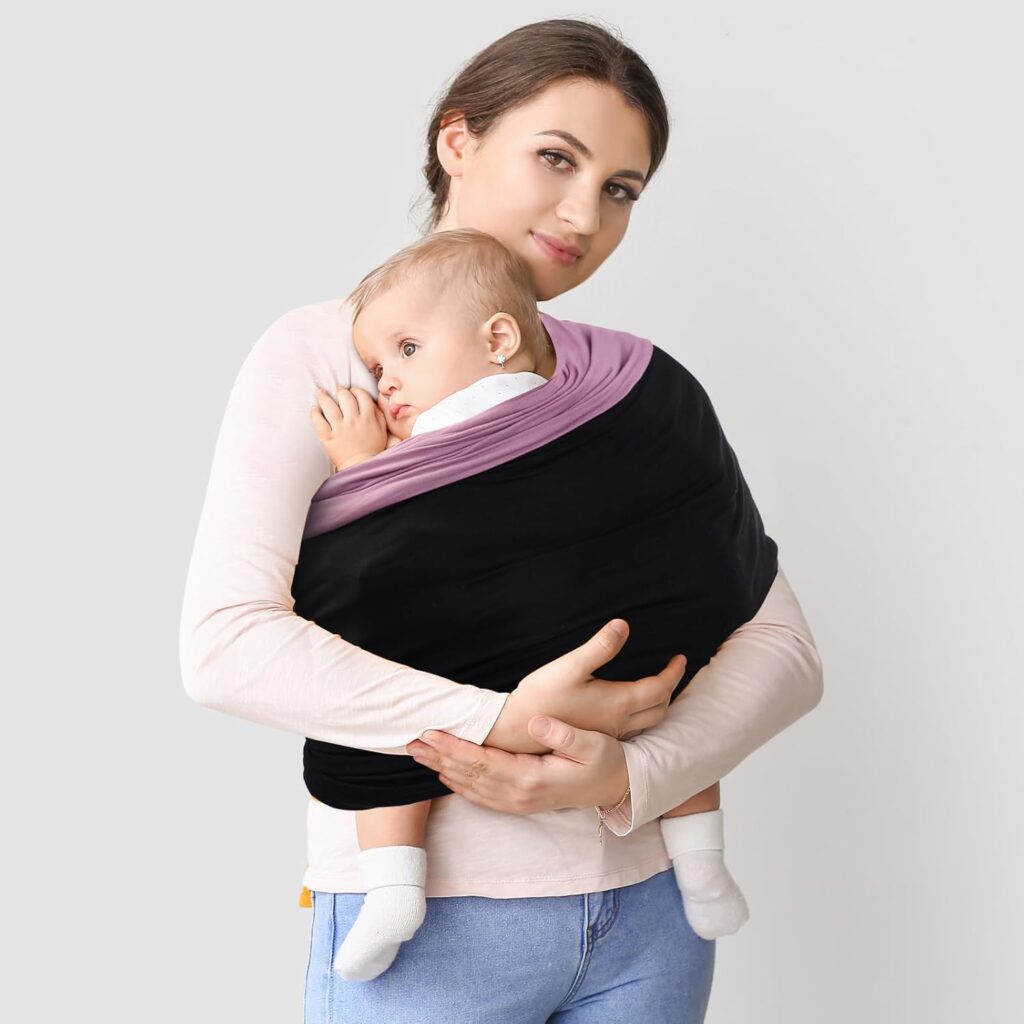
Credit : Amazon
The Benefits of Baby Carriers
Baby carriers offer more than just convenience. Here are the top benefits for parents and babies:
1. Promotes Bonding
Carrying your baby close strengthens the bond between parent and child. Babies love the warmth and heartbeat of their caregiver.
2. Supports Baby’s Development
An ergonomic carrier promotes healthy hip development, especially in the early months. It also helps babies feel secure and calm.
3. Increases Parent Mobility
With a carrier, your hands are free to multitask. You can easily handle chores, shopping, or outdoor activities without leaving your baby behind.
4. Reduces Crying
Studies show that babies carried frequently cry less. The closeness and gentle movement can soothe even the fussiest babies.
Budget-Friendly Options for Comfortable Baby Carriers
You don’t need to break the bank to find a great baby carrier. Here are some budget-friendly options:
1. Carrier D: Affordable Ergonomics
- Price: $50
- Features: Adjustable straps, breathable fabric, suitable for newborns.
- Perfect for parents looking for comfort on a budget.
2. Carrier E: Simple Wrap Design
- Price: $35
- Features: Stretchy fabric, compact storage, easy to clean.
- Great for light use with newborns.
3. Carrier F: Lightweight Backpack Style
- Price: $60
- Features: Multiple carrying positions, padded straps, durable materials.
- A versatile option for parents on the go.
Real-Life Testimonials
Hearing from other parents can help you decide. Here are some testimonials from happy baby carrier users:
- Maria, New York: “I love my Carrier A! It’s lightweight and makes daily errands so much easier. My baby loves being close to me.”
- Liam, Texas: “Carrier C has been a lifesaver for hiking trips. The lumbar support makes a big difference.”
- Sofia, California: “The wrap carrier was perfect for my newborn. It took a little practice, but now I can’t imagine life without it.”
Wrapping Up: Find the Right Baby Carrier for You
The best baby carrier for comfort depends on your needs, your baby’s age, and your daily activities. Here are some final tips to help you choose:
- Try it out. Comfort is subjective, so test different carriers if possible.
- Prioritize ergonomics. Look for designs that support both you and your baby.
- Think about your lifestyle. If you’re always on the go, a lightweight carrier might be best. For longer outings, choose one with extra padding and storage.
Investing in the right baby carrier can make life easier and more enjoyable for both you and your baby. Happy carrying!
Pros and Cons of Popular Baby Carriers
When selecting a baby carrier, understanding the pros and cons can help you make an informed decision. Below, we highlight the advantages and drawbacks of the most popular types of baby carriers.
1. Structured Baby Carriers
These carriers are sturdy, padded, and offer excellent support for both parents and babies.
Pros:
- Ergonomic design promotes healthy hip positioning.
- Offers multiple carrying positions (front, back, and sometimes hip).
- Padded straps and waistbands provide comfort during extended use.
- Typically suitable for babies from newborn to toddler.
- Easy to put on and take off with adjustable buckles.
Cons:
- Bulkier than other types of carriers.
- May feel warm due to padded fabric.
- Higher price range compared to wraps or slings.
Best For: Parents who prioritize support and durability over portability.
2. Wrap Baby Carriers
Wraps are long pieces of fabric that you tie around yourself to create a snug carrier.
Pros:
- Offers a close, womb-like experience for newborns.
- Lightweight and easy to pack for travel.
- Affordable compared to structured carriers.
- Versatile – can fit different body shapes and sizes.
Cons:
- Steep learning curve for tying securely.
- Less supportive for older babies or long durations.
- May feel less breathable in hot weather.
Best For: Newborns and parents who want an intimate, budget-friendly option.
73. Ring Sling Carriers
These carriers use a single piece of fabric looped through two rings to create a pouch for your baby.
Pros:
- Quick and easy to put on.
- Adjustable fit for parents of all sizes.
- Lightweight and great for short outings.
- Stylish and available in various colors and patterns.
Cons:
- Uneven weight distribution can cause discomfort for parents during long use.
- Limited carrying positions (mostly side or front carry).
- Not ideal for heavy toddlers.
Best For: Quick trips or parents looking for a fashionable, lightweight carrier.
4. Backpack-Style Carriers
Designed for outdoor adventures, these carriers are perfect for older babies and toddlers.
Pros:
- Offers excellent back support for parents.
- Includes storage compartments for essentials.
- Durable materials suited for hiking and long walks.
- Comfortable for heavier toddlers.
Cons:
- Bulky and not suitable for small babies.
- Expensive compared to other types.
- Takes up more storage space.
Best For: Outdoor enthusiasts with toddlers.
Choosing the Right Carrier
Every carrier has its strengths and limitations. The key is to match your carrier to your baby’s needs and your lifestyle. Consider trying out different types to see what works best for you.

